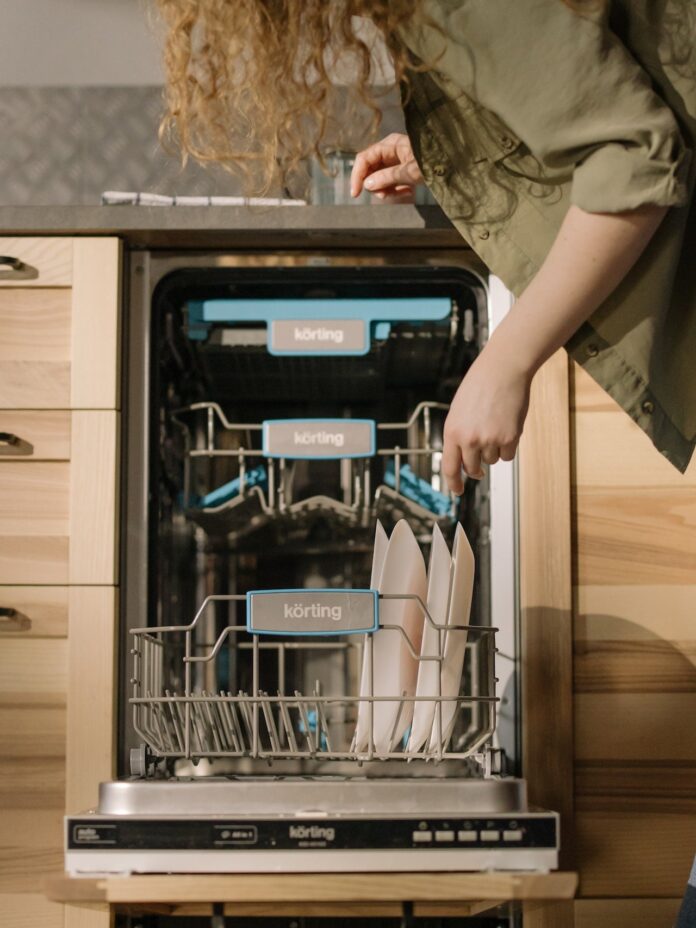
– Almost 8 million UK households wasting £71 a year by using their dishwashers incorrectly
– 3 in 5 households missing £38 saving by not using ECO mode (62%)
– Average cost of ‘double dishwashing’ is £25.48 per household, annually
– Each household wastes 4,576 litres a year pre-rinsing dishes
Needlessly rinsing items before loading the dishwasher, and not switching to ECO mode, is costing households around £70 a year in electricity and water[1] – seeing more than £450 million being poured down the drain each year, according to a new study.[2]
Utilita Energy – the UK’s only supplier created to help households use less energy – has analysed insights from a 2,000-household behaviour study to reveal the two most common – and costly – dishwasher habits that households are guilty of.
Three in five of the 12 million households with a dishwasher admit to pre-rinsing their dishes before loading the dishwasher (62%) at the cost of around £38 a year when using hot water, and £11 when using cold. For the one in three households who use their dishwasher twice a day (31%), the associated costs will double to £76 and £22, respectively.[3]
The average cost of double dishwashing is £25.48 per household, which wastes 4,576 litres of clean water each year – across all households that’s 2,422 Olympic-sized swimming pools of clean water each year.
On average, ‘double dishwashers’ rinse for 30 seconds up to two minutes each time, with two in five households (42%) admitting to rinsing items until they are sparkling clean, despite the machine having a rinse mode.
The study revealed that three in five households have never used their dishwasher’s eco mode (62%), which has the power to save each household £34 a year, on average. Almost half of all dishwasher households have never changed the machine’s settings at all (46%).
Utilita’s energy behaviour study revealed why households pre-rinse. The top five reasons given were:
- Concerned about clogging the dishwasher – 59%
- Want to keep the dishwasher clean – 39%
- To avoid breaking the machine – 39%
- It’s a force of habit – 37%
- To avoid the dishwasher smelling – 30%
Households who choose not to pre-rinse gave the following rationale:
- It’s a waste of water – 59%
- Pointless when the machine rinses them – 53%
- My dishwasher has a rinse on the cycle 31%
- My dishwasher tablets advise not to rinse – 25%
- I can’t stand touching dirty plates – 7%
The environmental impact of ‘double dishwashing’ alone is equivalent to the carbon emissions generated by driving 849 million miles in a standard car – that’s 34,000 times around the Earth’s equator.
Utilita’s Head of Sustainability, Archie Lasseter, comments on the energy supplier’s latest energy behaviour study:
“Knowing what our habits are costing us can encourage us to reconsider our behaviours, and in this case, the savings are significant, so should hopefully make households think twice.
“We can tell households how much money they’ll save, but until they load the dishwasher without pre-rinsing, and see positive results every time, they won’t be convinced. We hope that this informative campaign will encourage people to put confidence in their machines and save the pocket and the planet in the process.”
Paul Hide, Chief Executive, the Association of Manufacturers of Domestic Appliances comments on the important study:
“Dishwashers are one of the home’s most hard-working appliances – they are designed to provide a full dishwashing function, which includes rinsing, so we must put our trust in them to save time, money, and the environment.
“Our own research reveals that most households avoid the eco-mode on home appliances due to it taking longer. We need to help consumers understand the benefits. By taking longer to agitate the dirt on dishes, the dishwasher doesn’t need to heat the water to such high temperatures, which saves around 30 percent of energy on each dishwasher cycle – it’s the same for washing machines, too.”
The study also revealed that dishwasher tablet manufacturers’ ‘no need to rinse’ advice on packaging is getting noticed, with 49% of households claiming to have spotted the advice.
Archie Lasseter continues: “We’re really motivated by the fact that dishwasher tablet manufacturers are encouraging consumers not to rinse, too. Through our behaviour science research, we know these types of visual cues and reminders really help when forming new energy efficiency habits.”
Collette Parker, Customer Engagement Manager at Anglian Water, the largest water company by geographic area supplying more than 4 million customers, comments on Utilita’s latest education campaign:
“A full dishwasher uses around 10 times less water than handwashing the same number of dishes, but that saving is undermined when dishes are pre-rinsed before being loaded into the dishwasher.
This is a very important message for the 12.3 million households across the country who use a dishwasher today, especially as these significant water savings could also help save households money off bills at a time when the ongoing cost of living crisis is impacting so many of us right now.
“We encourage households to keep up the good work in scraping their plates in bins or food waste caddies before loading them into the dishwasher as this helps avoid blockages in the sewer pipes closer to home and keeps them flowing freely and avoiding costly intervention and disruption.”
Electricals retailer AO.com’s dishwasher expert, Gwil Snook, backs the research – he comments:
“Insights such as these go a long way with AO customers, who tend to strike a balance between being savvy, whilst making the right decisions by the planet. We sell a wide range of modern dishwashers that feature an eco-mode, in fact since energy prices started to rise, we’ve seen a 467% rise in customers searching for machines that feature an ‘economy wash’.”
For more information on how to save hundreds by making simple tweaks to our home energy behaviours, visit Utilita’ Energy High 5 at www.utilita.co.uk/energyhigh5.
Help keep news FREE for our readers
Supporting your local community newspaper/online news outlet is crucial now more than ever. If you believe in independent journalism, then consider making a valuable contribution by making a one-time or monthly donation. We operate in rural areas where providing unbiased news can be challenging. Read More About Supporting The West Wales Chronicle

























